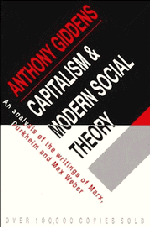Book contents
- Frontmatter
- Contents
- Acknowledgements
- Preface
- Introduction
- List of abbreviations used
- Dedication
- Part 1 Marx
- Part 2 Durkheim
- Part 3 Max Weber
- 9 Max Weber: Protestantism and capitalism
- 10 Weber's methodological essays
- 11 Fundamental concepts of sociology
- 12 Rationalisation, the ‘world religions’, and western capitalism
- Part 4 Capitalism, socialism and social theory
- Postscript: Marx and modern sociology
- Bibliography of works cited in text
- Index
9 - Max Weber: Protestantism and capitalism
Published online by Cambridge University Press: 05 August 2013
- Frontmatter
- Contents
- Acknowledgements
- Preface
- Introduction
- List of abbreviations used
- Dedication
- Part 1 Marx
- Part 2 Durkheim
- Part 3 Max Weber
- 9 Max Weber: Protestantism and capitalism
- 10 Weber's methodological essays
- 11 Fundamental concepts of sociology
- 12 Rationalisation, the ‘world religions’, and western capitalism
- Part 4 Capitalism, socialism and social theory
- Postscript: Marx and modern sociology
- Bibliography of works cited in text
- Index
Summary
While Max Weber was an almost exact contemporary of Durkheim, the intellectual climate in which each lived was, in important respects, very different. The short period which Durkheim spent studying in Germany while a young man served to introduce him to some of the leading trends in German social thought, and he did not subsequently relinquish his interest in the works of German social scientists. Durkheim was certainly acquainted with Max Weber's writings, as well as with those of the latter's brother, Alfred. There are at least two sets of writings by German authors which connect Durkheim and Weber directly: those of Schindler and the members of the Verein für Sozialpolitik on the one hand, and those of Georg Simmel on the other. But even these fairly direct intellectual connections are of marginal significance. While Simmers thought undoubtedly was of some importance in the shaping of Weber's views, Durkheim was highly critical of Simmel, and was not influenced by the latter's writing in any important respects; and while the writings of Schmoller and the Kathedersozialisten formed a point of departure for Durkheim's early works, those aspects of their views which Durkheim found most sympathetic were exactly the ones which Weber rejected, and indeed fought against.
- Type
- Chapter
- Information
- Capitalism and Modern Social TheoryAn Analysis of the Writings of Marx, Durkheim and Max Weber, pp. 119 - 132Publisher: Cambridge University PressPrint publication year: 1971
- 2
- Cited by



